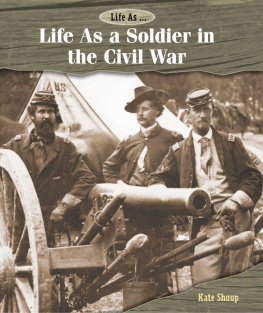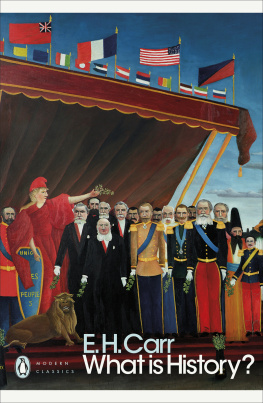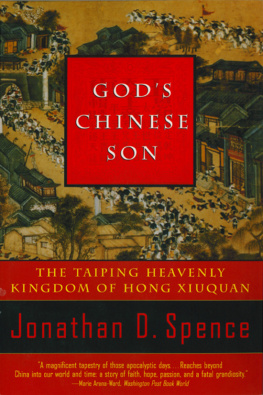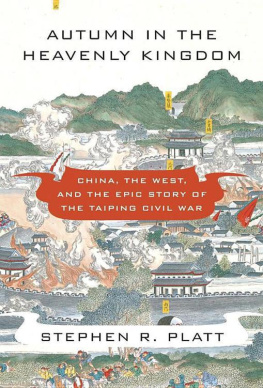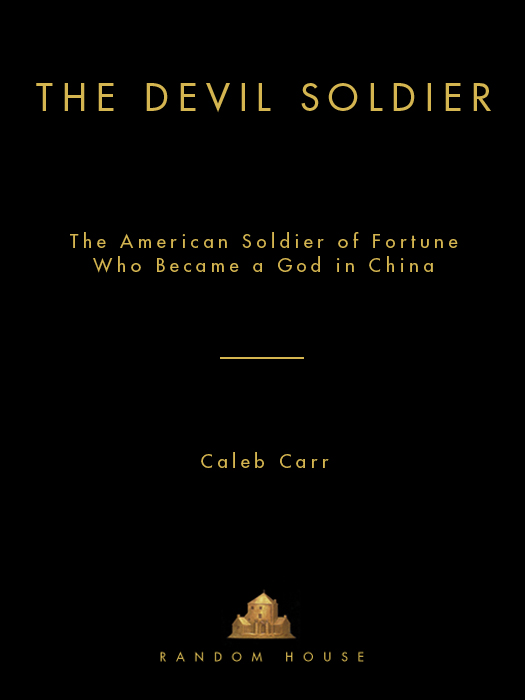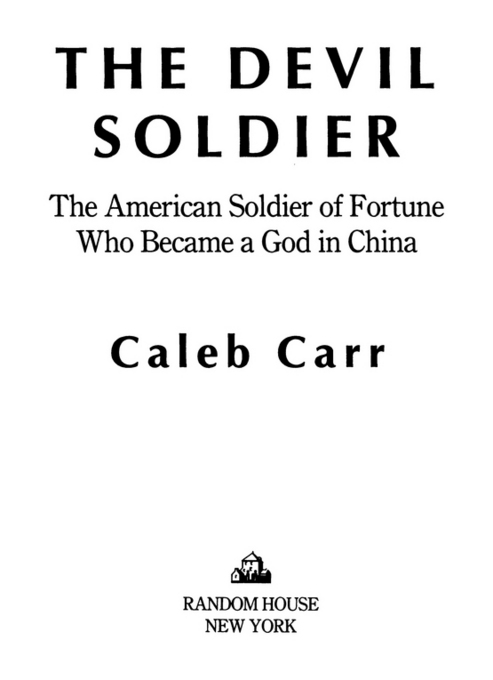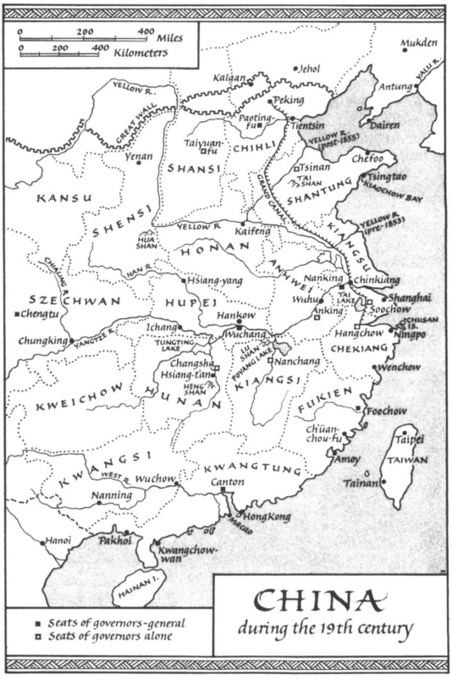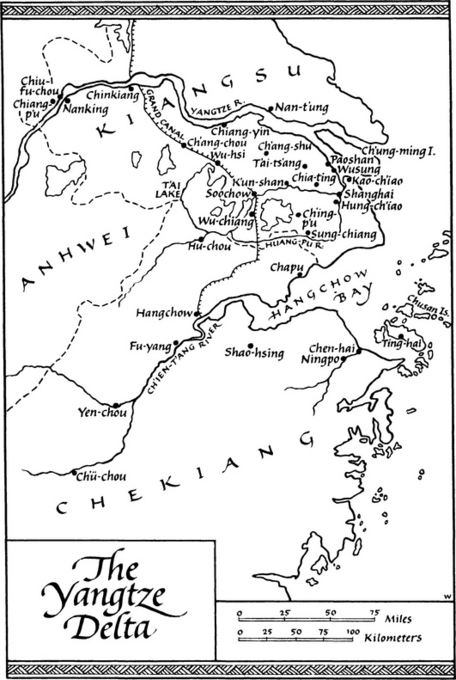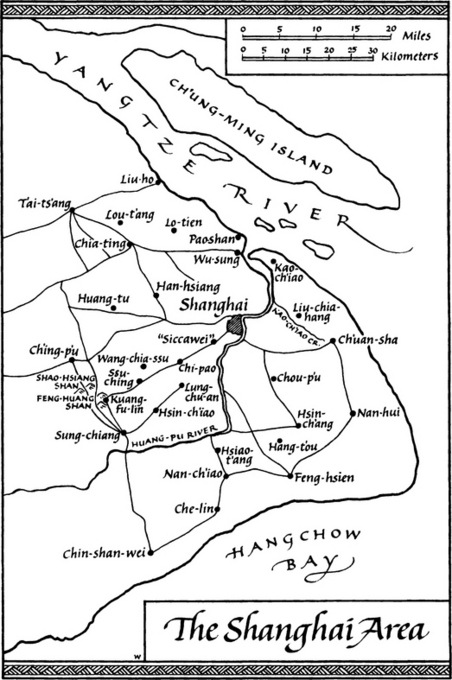Copyright 1992 by Caleb Carr
All rights reserved under International and Pan-American Copyright Conventions. Published in the United States by Random House, Inc., New York, and simultaneously in Canada by Random House of Canada Limited, Toronto. This work was originally published in hardcover by Random House, Inc., in 1991.
Library of Congress Cataloging-in-Publication Data
Carr, Caleb
The devil soldier: the American soldier of fortune who became a god
in China/Caleb Carr.
p. cm.
eISBN: 978-0-307-76552-9
1. Ward, Frederick Townsend, 1831-1862. 2. ChinaHistory
Taiping Rebellion, 1850-1864Personal narratives, American.
I. Title.
DS759.35.W37C37 1995
951.034092dc20 94-45844
[B]
v3.1
A NOTE ON NAMES
Because of the vast array of spellings used in the translation of Chinese during the nineteenth and twentieth centuries, all place and personal names in the following text have been adjusted to a uniform system, regardless of their source. A slightly older style of translation than the current Pinyin has been used, because it is easier for English-speaking readers to pronounce. This explains why Beijing is still Peking and why American, Chinese, British, and French speakers and writers appear to be using the same spellings, when in fact they employed many different versions.
C.C.
CONTENTS
Prologue:
Across the Sea to Fight for China
I:
A New Race of Warriors
II:
Perhaps You Smile
III:
As If by Magic
IV:
Not As Was Hoped, Dead
V:
Astonished at the Courage
VI:
His Heart Is Hard to Fathom
VII:
Accustomed to the Enemys Fire
Epilogue:
Poor Old Ward
PROLOGUE
ACROSS THE SEA TO
FIGHT FOR CHINA
In the summer of 1900 an expeditionary force of European, Japanese, and American soldiers marched into the Chinese capital of Peking, the triumphant blare of their bands and bugles announcing not only the conclusion of a successful campaign but the effective end of thousands of years of imperial rule in China. The last of the Middle Kingdoms dynasties, the Manchu (or Ching), had withstood internal and external threats throughout the nineteenth century, and would hold on for eleven more years before a tide of republican revolution would engulf it completely. But all hope of recovery was in fact lost when the Western and Japanese troops entered Peking and its sacrosanct Forbidden City, the inner compound guarded by high walls that for centuries had been the residence of Chinas rulers. The violation of the Forbidden City by barbarian foreigners stripped the Manchus of any legitimate right to rule in the eyes of many Chinese, and the imperial clique was finally seen for what it was: an arrogant, corrupt group of anachronisms, whose sumptuous world of silk dragons, peacocks feathers, and divine rule had no place in the twentieth century.
The Western and Japanese governments had ordered the march on Peking because a group of antiforeign Chinese extremists known as the Boxers, under orders from the Empress Dowager Tzu-hsi, had laid siege to their diplomatic legations and attempted to kill their ministers. The attack on the legations was a stupendously rash act, the crowning achievement of an imperial elite that had spent the last half century trying to stem the advance of foreign influence in China and preserve the empire in its near-medieval state. All such efforts had been in vain: The barbarian outsiders had finally pried China open to foreign trade, foreign religion, and foreign political ideas. The bitter Tzu-hsi had meant to make the foreign devils pay for their success when she authorized the attack on the legations in June 1900. But the Western diplomats and their families had once again frustrated her by bravely withstanding the siege. When the multinational relief column marched into Peking in July, Tzu-hsi fled in disgrace, taking with her the last chance of imperial resurgence. In the conflict between unreasoning Chinese pride and relentless foreign commercial and philosophical expansionism that had raged for sixty years, there seemed to be no middle ground, and now Chinese pride had lost the long battle.
Yet there had once been such a middle ground in the Middle Kingdom, or at least the possibility of it. For the briefest of moments during the 1860s, the imperial government in Peking as well as the foreign powers had gotten a glimpse of a China in which progressive Western ideasparticularly military ideaswould be placed at the service of the emperor and his ministers to ensure the empires survival and participation in a rapidly changing world. Unfortunately, both the Chinese imperialists and the Westerners, as if horrified by their glimpse of this strange future, had slammed the door on it; but not before the names of those who had so briefly cracked the portal open had been recorded and honored by the Chinese people. Legends quickly grew around those names, as at least one group of American soldiers discovered during their occupation of Peking in the summer of 1900. Writing a quarter of a century later, one of these men recalled,
There was much talk among the soldiers as to who had been the first to enter the Forbidden City, where no white devil was ever supposed to have been before. One day a group of us were arguing about the matter before a little Chinese shop, where we had stopped for one thing or another, and of a sudden the old merchant spoke up, in pidgeon English.
What did it matter, he wanted to know, which one of us had by force of arms broken into the temples of the gods? We were disrespectful of the gods, we were like burglars, for all our bravery. And we could never be the first white men to enter a sacred Chinese temple, anyway, because there was Hua, the White God. Hua had been braver than any of usand he had been good, too. He had come from far across the sea to fight for China, and he had been carried into a sacred temple, and was there still. His was a victory of right.
The Hua of whom the old Chinese merchant spoke was Frederick Townsend Ward, a young soldier of fortune from Salem, Massachusetts, who had come to China in 1859 and offered his services to the imperial government in its bitter war against a hugely powerful group of quasi-Christian mystics calling themselves the Taipings. When he arrived in Shanghai, Ward was twenty-eight years old and penniless; when he died in battle three years later, he was the most honored American in Chinese history, a naturalized Chinese subject and a mandarin entitled to wear the prestigious peacock feather in his cap. He had married the daughter of another mandarin and received high praise from the emperor. But above all, he had assembled out of the most improbable elements an army that was unlike anything China or the world had ever seen: a highly disciplined force of native Chinese soldiers commanded by Western officers that was expert in the use of modern foreign weapons and capable of defeating vastly superior numbers of opponents in the field. Known to the Taiping rebels as devil soldiers, Wards men were dubbed the


